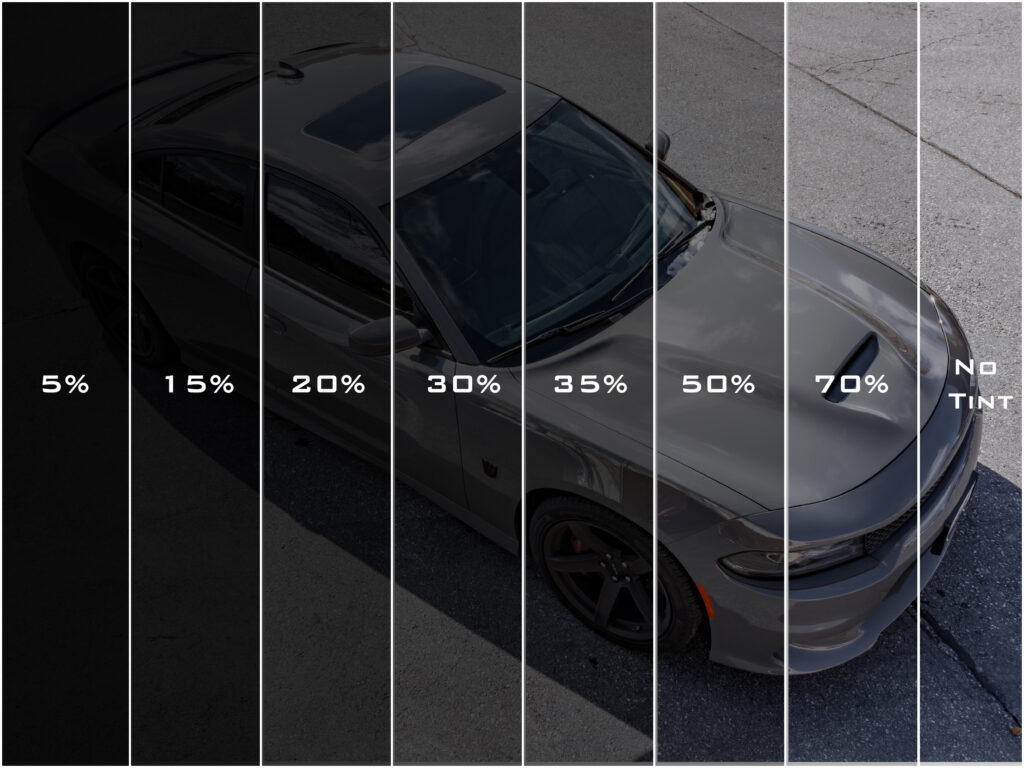
Tinting your car offers many benefits beyond just style and aesthetics. Car window tinting helps protect you, and your passengers, from the sun’s harmful UV rays, while also keeping your interior cool and providing added security and privacy. There are three levels of tint – low, mid-level, and dark – each offering their own unique benefits. In addition to these shade options, there are two types of film for tinting: ceramic and regular. Read on to find out more about the advantages of tinting your car as well as what makes ceramic film different from regular film.
One of the primary benefits of tinting your car is protection from the sun’s UV rays. Children are especially vulnerable to UV exposure as they have thinner skin than adults. Tinted windows can help block up to 99% of harmful UVA and UVB rays that can cause sun damage or skin cancer over time, especially with prolonged exposure. This is particularly important if you often take long drives with children in the backseat. Additionally, car window tints act as a barrier against heat both inside your vehicle and out; tints deflect heat away from the windows while reflecting it away from people within the car. This can help keep temperatures cooler in both sunny climates and hot summer months.
Another advantage of window tints is an added layer of privacy for you and your family when inside the vehicle. While there are laws prohibiting overly dark tints (which vary by state), medium-dark shades still provide effective coverage so that people outside cannot see through into your vehicle’s interior clearly if at all. This is especially beneficial if you are carrying items in plain view that could be seen as desirable targets for thieves or those looking to break into cars for valuables left behind in plain sight.
The two types of film used for window tints are ceramic film and regular non-ceramic film (sometimes called Dyed Window Film). Ceramic window films offer better protection against ultraviolet rays than conventional dyed films because they contain ceramic particles which reflect rather than absorb light while blocking 99%+ of UVA/UVB radiation meaning less fading on fabrics or discoloration caused by prolonged exposure to sunlight over time that traditional dye-based films may cause due to oxidation resulting from their chemical composition over time with prolonged exposure to sunlight.. The downside of ceramic films is cost: they tend to be more expensive than regular non-ceramic films due to their higher quality components being used in manufacturing them but tend to last longer than traditional die based window films due to their highly reflective properties which helps reduce interior temperatures significantly compared to traditional dye based window films by creating a heat shield effect by deflecting rather than absorbing thermal energy radiating off surfaces creating so much less “heat soak” thus making them more thermally efficient then traditional die based window films.. However, regular non-ceramic tints also offer significant protection from UV rays so it really comes down to personal preference when choosing between these two types of film for window tinting applications..
In conclusion, car window tinting offers multiple benefits including protection from ultraviolet rays, improved comfort through its ability to keep interiors cooler during hotter months, greater privacy when inside the vehicle, as well as aesthetic value when properly applied with a skillful hand. Furthermore there are two types of film available – ceramic film and non-ceramic (also known as dyed) – each offering its own unique advantages depending on needs or preferences making it easier than ever before for anyone looking into getting their windows professionally tinted at any given time without having too much difficulty selecting the right type or level of tint needed to get maximum performance out any given application..
Visit our facebook page
